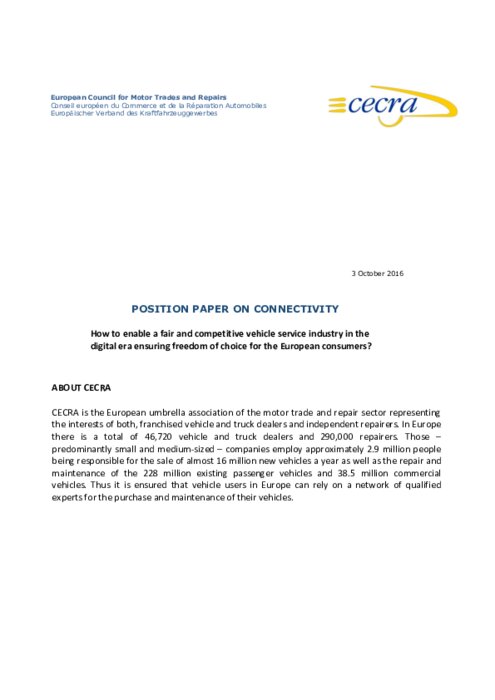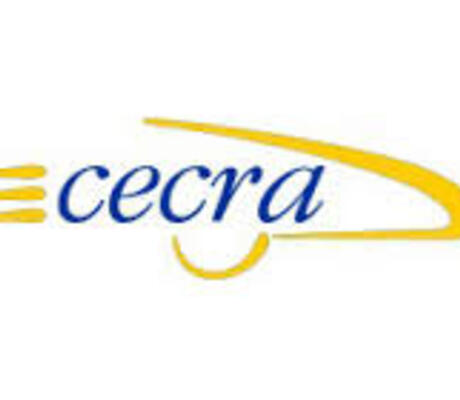Voir ci-dessous le Communiqué du Cecra en anglais
Car dealers and repairers need equal access to vehicle data
The increasing number of services based on the in-vehicle telematics system will most likely result in a significant improvement of consumer and social welfare in the years to come. In its position paper, CECRA says that this bright future will hardly come true without an equal access to vehicle data by car sales and aftersales operators.
In the last few years the automotive industry has made some significant steps forward in the telematics technology. Vehicles are increasingly able to remotely connect with the outside world and enhance the in-vehicle experience. The range of telematics-based services is potentially very wide and it goes from traffic information, to street parking management, usage-based insurance schemes, and – in the case of vehicle sales and aftersales sector – remote diagnostics and predictive maintenance. The consumer and societal benefits, as well as the case for new business models, stemming from the development of those new services are extremely significant.
European automotive dealers and repairers, who are constantly striving to provide their customers with the best possible service, have welcomed these technological advances and are investing heavily in order to develop applications that will meet the rising customer expectations.
In such a new technological environment, the development of cutting-edge and tailor-made applications requires a free and real-time access to in-vehicle generated data* . Nevertheless, all in-vehicle telematics system in the automotive sector are being technically designed in such a way that only vehicle manufacturers are allowed to directly access the in-vehicle-generated data. This technical obstacle is artificially restricting the free competition within the European market of vehicle-data-related services as well as customer freedom of choice.
CECRA’s President Jean-Charles Herrenschmidt: “CECRA’s position on the access to vehicle data is the only viable one as it ensures a level playing field for all concerned third parties who want to invest in the creation of new data-related services to better meet the increasing expectations of consumers.
For this reason CECRA’s campaign has already gathered the support of distributors of cars, commercial and industrial vehicles, authorised and independent repairers.
Other stakeholders such as the aftermarket sector, the leasing companies, and the consumers are also on our side”.
Furthermore, in the concept that is currently under discussion, the ‘Extended Vehicle concept’, data which was received by the vehicle telematics system becomes information that would be channelled only through the manufacturers’ proprietary servers. This would give vehicle manufacturers exclusive control to the access of in-vehicle generated data, allowing them to impose their own business models and monitor the businesses of third parties which directly compete with them.
Such a system is not acceptable in many respects such as competition, customer freedom of choice and furthermore it does not comply with the general principle provided for in the eCall Regulation (EU) 2015/758, which clearly indicates the need for in-vehicle systems to be based on an interoperable, standardised, secure and open-access platform (I.S.S.O.A.) for possible future in-vehicle applications or services.
In its position paper, CECRA firmly calls – in the interest of the European consumers - for a technical solution which ensures the creation of a level playing field through equal access to in-vehicle generated data for all market players in the digitalised automotive market.
Moreover, within its document, CECRA has also identified a promising example of such a technical solution in a ‘Third-Party-Access solution’. This solution, which is based on the existing in-vehicle telematics systems, would ensure the needed access to data to responsible third parties with no risks or additional costs neither for consumers nor for vehicle manufacturers.
CECRA’s Director General Bernard Lycke: “According to EU Commissioner for Competition Margrethe VESTAGER: ‘Companies … need to be sure that pooling data doesn't become a way to shut rivals out of the market … It's one thing to decide who you want to cooperate with. But that decision shouldn't deny the others a chance to compete.
Because a world of self-driving cars is quite appealing. It offers the promise of less pollution, fewer accidents, and better mobility for people with disabilities. But it's hardly progress if that means reducing competition, and making people pay too much for their cars".
* We consider 'in vehicle generated data' as all data generated/processed by vehicles (both technical and personal data)

